May, 2020: COVID-19 Prevention Training Update at Mbiuni Community
Our teams are working on the frontlines of the COVID-19 pandemic. Join us in our fight against the virus while maintaining access to clean, reliable water.

We are carrying out awareness and prevention trainings on the virus in every community we serve. Very often, our teams are the first (and only) to bring news and information of the virus to rural communities like Mbiuni, Kenya.
We trained community members on the symptoms, transmission routes, and prevention of COVID-19.
Before there were any reported cases in the area, we worked with trusted community leaders and the Water User Committee to gather community members for the training. At the time, social distancing was a new concept, and one that challenges cultural norms. Although community members were hesitant to adopt social distancing during the training, we sensitized them on its importance and effectiveness in combating the spread of the virus.
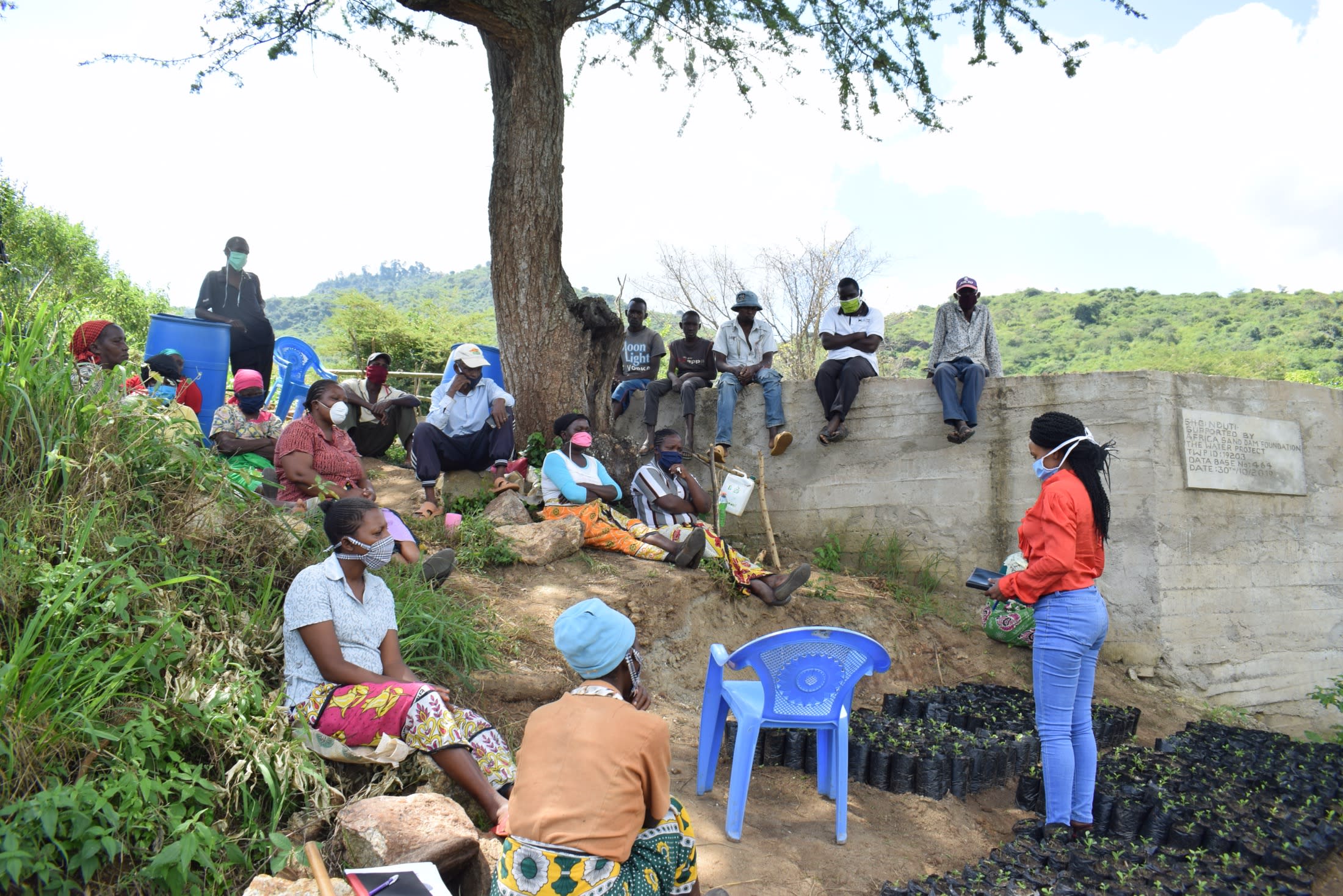
We covered essential hygiene lessons:
- Demonstrations on how to build a simple handwashing station
- Proper handwashing technique
- The importance of using soap and clean water for handwashing
- Cleaning and disinfecting commonly touched surfaces including at the water point.

We covered COVID-19-specific guidance in line with national and international standards:
- Information on the symptoms and transmission routes of COVID-19
- What social distancing is and how to practice it
- How to cough into an elbow
- Alternative ways to greet people without handshakes, fist bumps, etc.
- How to make and properly wear a facemask.
During training, we installed a new handwashing station with soap near the community’s water point.

Due to the rampant spread of misinformation about COVID-19, we also dedicated time to a question and answer session to help debunk rumors about the disease and provide extra information where needed.
Water access, sanitation, and hygiene are at the crux of disease prevention. You can directly support our work on the frontlines of COVID-19 prevention in all of the communities we serve while maintaining their access to safe, clean, and reliable water.

February, 2020: Mbiuni Community Sand Dam Complete!
Mbiuni, Kenya now has access to a new source of water thanks to your donation. A new sand dam was constructed on a sandy riverbed, which will build up sand to raise the water table and naturally filter water.
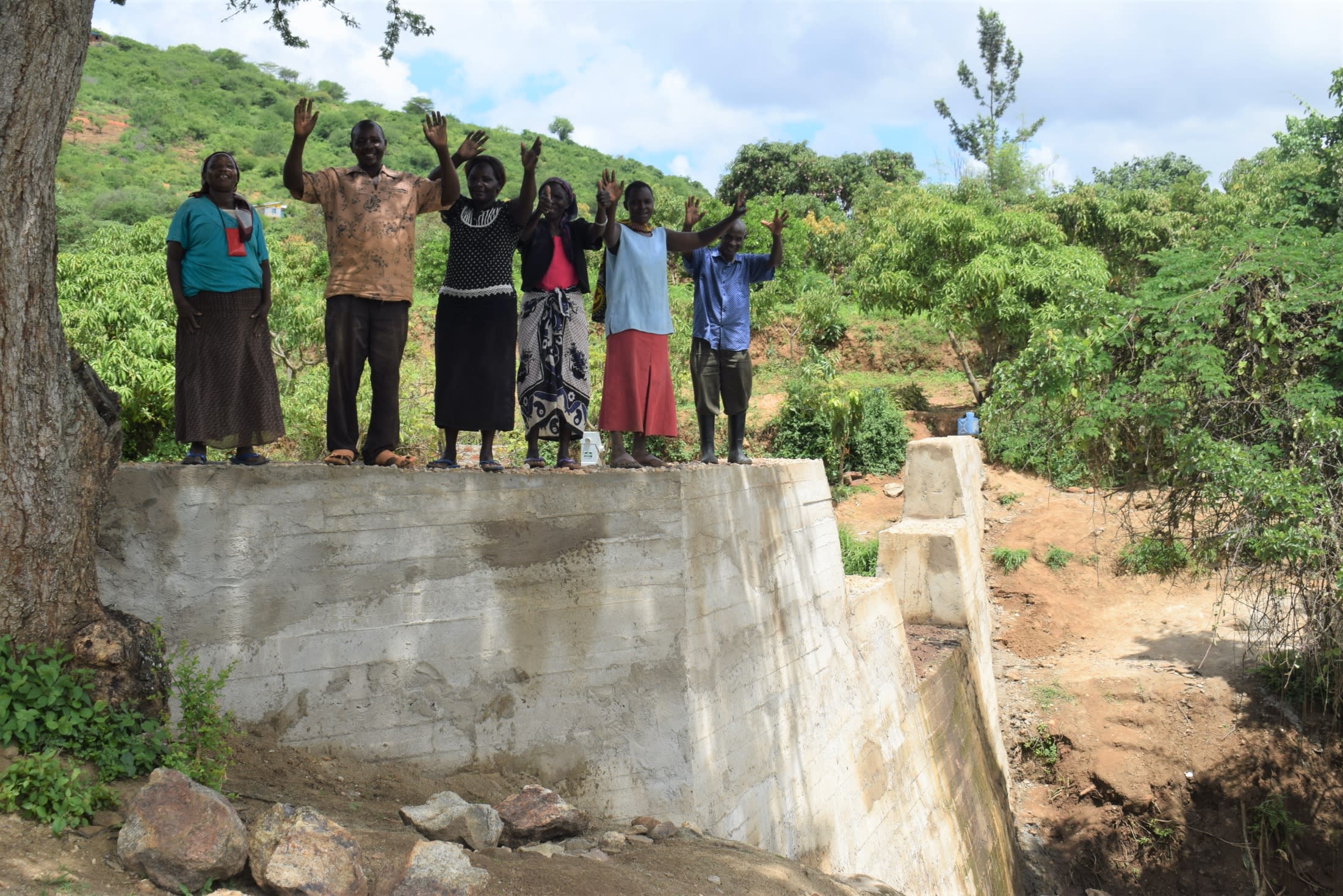
"This project is a new intervention in our area and we are very optimistic about it. As soon as we had completed the construction, the project had already harvested gallons of water which are set to assist the community members in easy access to clean water. The distances initially covered to fetch water will now be reduced for people here and the quality of water will improve," said Mr. Eluid Kyungu, Chair of the water committee here.
We worked with the Nduti Self-Help Group for this project. ‘Nduti’ is the local name given to very tiny insects that work very hard in unity and with great dedication to collect food for themselves. The self-help group, therefore, named their group Nduti to emulate the behaviors of these insects.

The members and their families contributed materials and physical labor to complete the project. In addition, they were trained on various skills such as bookkeeping, financial management, project management, group dynamics, and governance. We also conducted a hygiene and sanitation training to teach skills like soapmaking and to help improve behaviors such as handwashing.
When an issue arises concerning the water project, the group members are equipped with the necessary skills to rectify the problem and ensure it works appropriately. However, if the issue is beyond their capabilities, they can contact our team of field officers to assist them.
Sand Dam
The community members collected all of the local materials like rocks and sand that were required for the successful completion of the dam. They also provided labor to support our artisans. The collection of raw construction materials takes longer than the actual construction. For a large sand dam, materials collection could take up to 4 months.
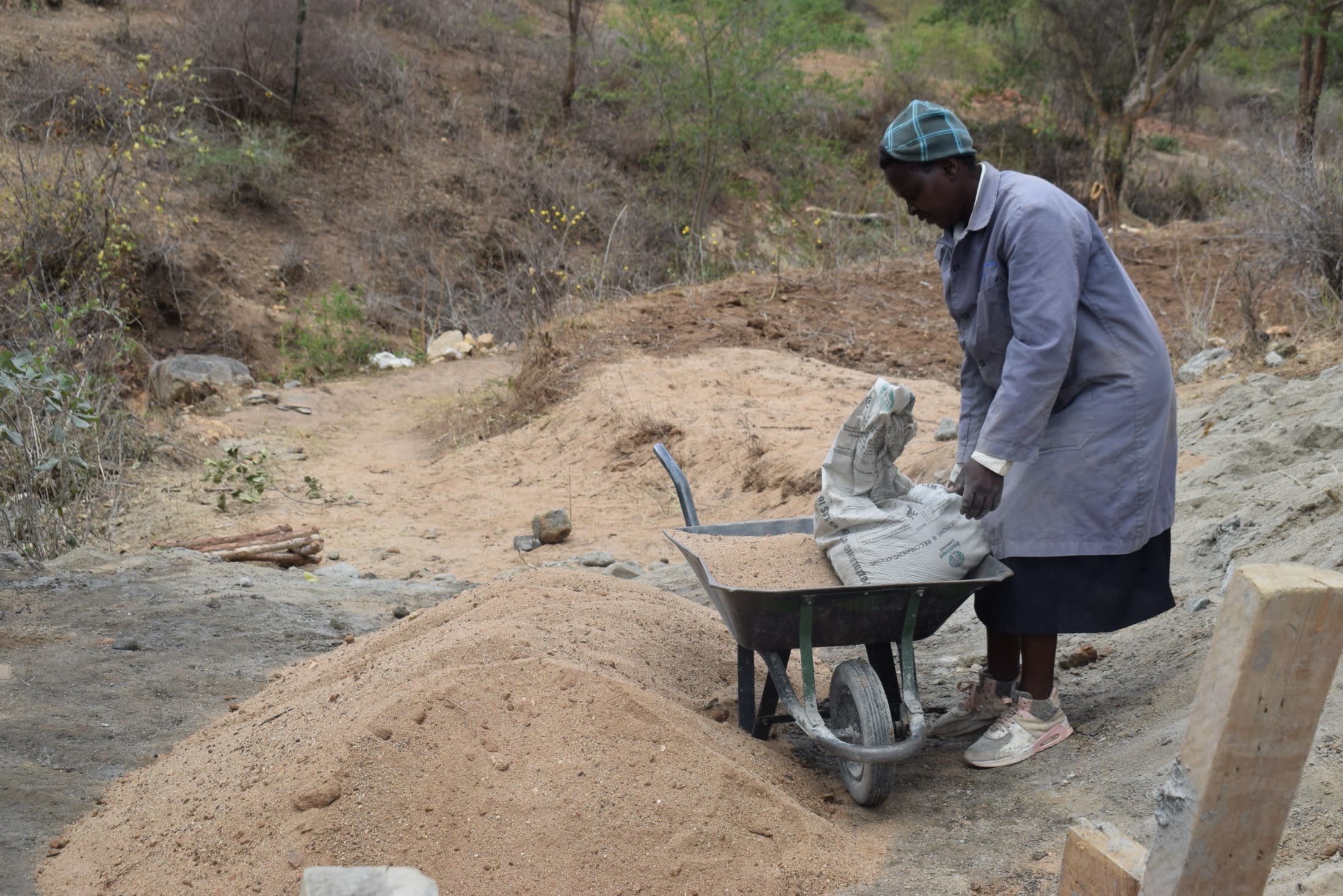
Siting and technical designs were drawn and presented to the Water Resources Management Authority and a survey sent to the National Environment Management Authority for approval before construction started. Once approved, we established firm bedrock at the base of the sand dam wall. In the absence of good bedrock, excavation is done up to a depth at which the technical team is satisfied that the ground is firm enough to stop seepage.
Then mortar (a mixture of sand, cement, and water) is mixed and heaped into the foundation. Rocks are heaped into the mortar once there is enough to hold. Barbed wire and rebar are used to reinforce the mixture.

Once the foundation is complete, a skeleton of timber is built to hold up the sludge and rocks above ground level. The process is then repeated until a sufficient height, width and length are built up. The vertical timber beams are dismantled and the dam is left to cure.
The dam measures 38 meters long and 4.5 meters high and took 510 bags of cement to build.

Sand dam construction was simultaneous to the construction of a hand-dug well, which gives locals a safer method of drawing water. As the sand dam matures and stores more water, more of it will be accessible as drinking water from the well. To see that hand-dug well, click here.
As soon as it rains, the dam will begin to build up sand and store water. With this water, the surrounding landscape will become lush and fertile. However, it could take up to 3 years of rain for this sand dam to reach maximum capacity.

New Knowledge

Upon completion of the dam and well, this group was taken through a Participatory Hygiene and Sanitation Transformation training aimed at enabling them to improve their hygiene and sanitation as well as manage their water and sanitation facilities. The 3-day training was arranged when the field officer in charge of the Matiliku region, Mr. Jeff Maluki, informed the members about the training during their sand dam construction. The chairperson followed up with all of the members to ensure they attended the training on the scheduled 3 days.
The trainer conferred with the field staff about their previous visits to households and interviews with community members to determine which topics the community still could improve upon.
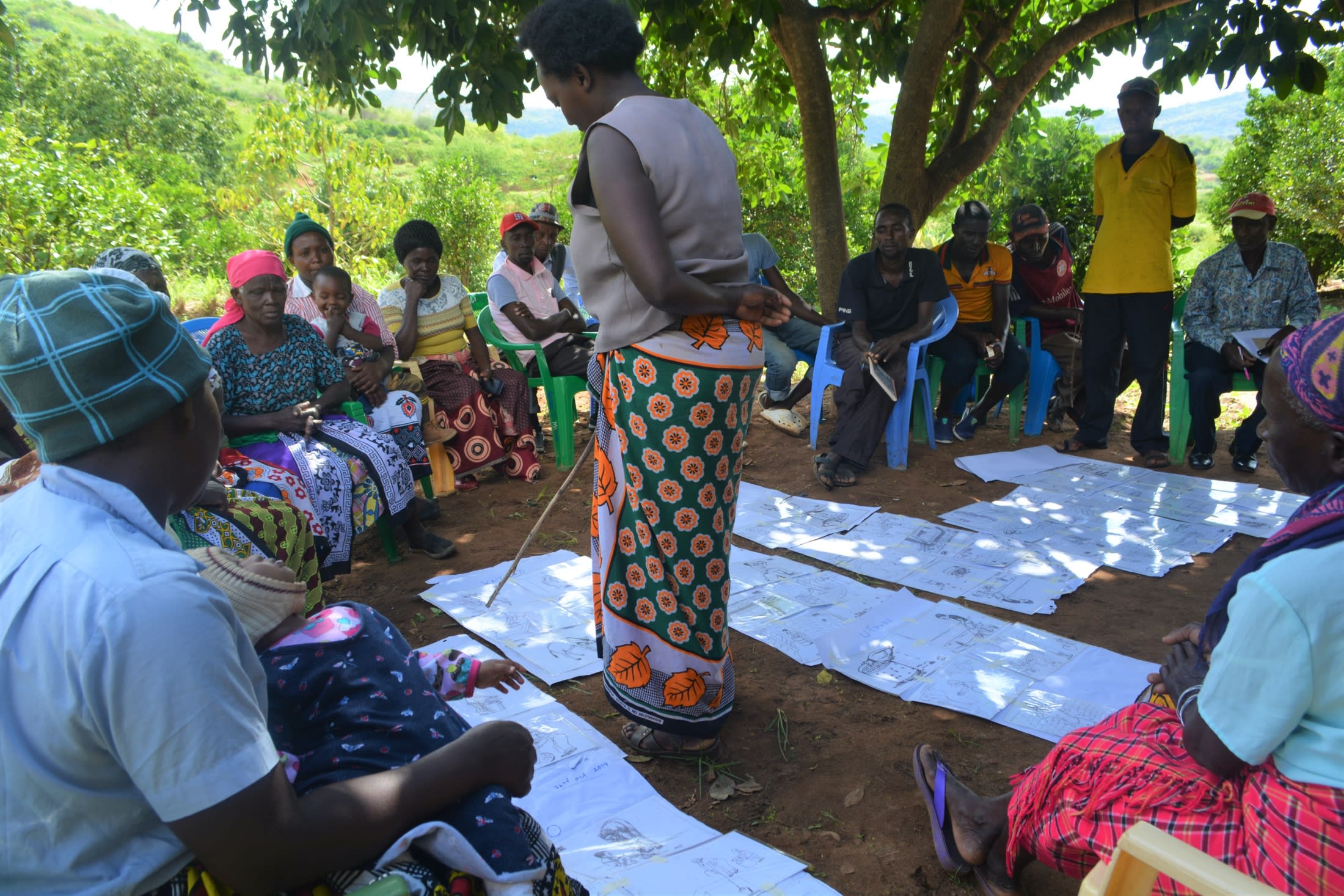
They decided to train on topics including health problems in the community; good and bad hygiene behaviors; how diseases spread and their prevention; choosing sanitation improvements; choosing improved hygiene behaviors; planning for behavioral change; handwashing; and soapmaking.
On the day of the training, the weather was cold and chilly as it was the rainy season. The participants converged at Joseph Ndemange's homestead. Joseph is one of the members of the group and his homestead was centrally positioned to most of the other members' homes as it is 100 meters from their sand dam. The attendance was as expected with all of the group members participating, as well as several local leaders.
The participation and involvement levels of the members were commendable as they were active throughout the session. This was attributed to the training methodologies that were applied by the facilitator which encouraged the members to participate. Some of the methods employed included group discussions, a recap of the previous lessons at the beginning of each day, and demonstrations, among others. This ensured maximum participation from all of the participants.

During the soapmaking demonstration, the participants shared stories of how they have compiled and stored many dirty clothes due to a lack of soap. Seeing the final product excited them as they were very happy to have finally gotten affordable soap which requires very little skill to make. This made the topic interesting with all of the participants willing to buy the ingredients. The main purpose of this project is to help the group to improve their hygiene and sanitation as well as generate income through the sale of their homemade soap.
The participants were very happy to learn how to construct a tippy tap and most of them vowed to construct one back at their homesteads as soon as they got home. Tippy tap construction topped their list when they were writing their action plan. This was a good gesture from the participants and it made the topic memorable.

"The training has increased our knowledge of hygiene and sanitation. Through this training we have learned very simple sanitation infrastructures like the tippy taps, utensil racks, and the establishment of garbage pits, among others, which we will implement at our homesteads to enable us to improve our health and hygiene," said Eluid Kyungu after the training.
Thank you for making all of this possible!


 Sand Dam
Sand Dam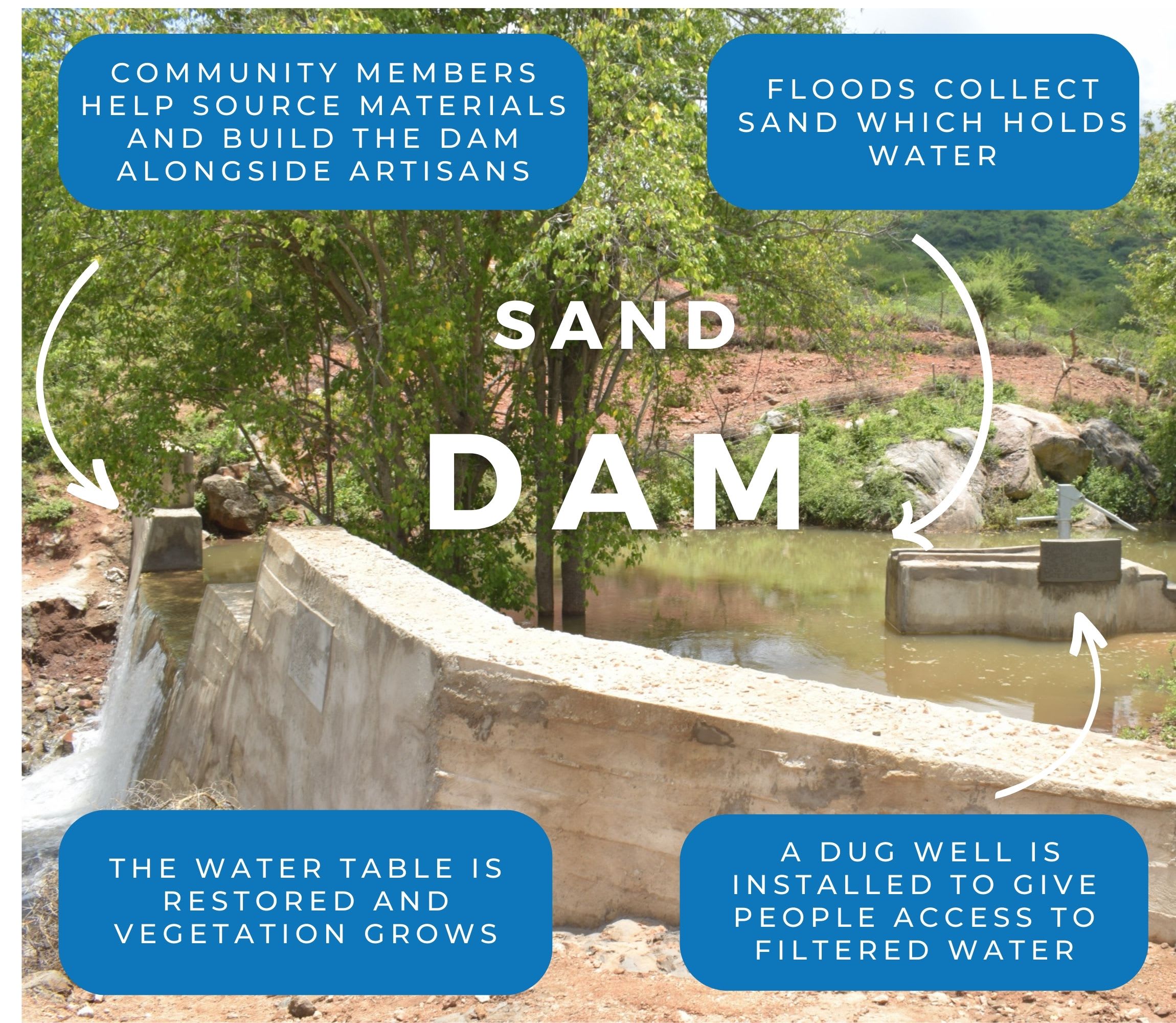
 Rehabilitation Project
Rehabilitation Project







































